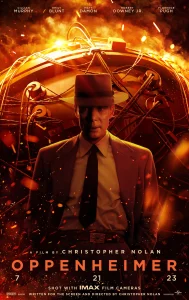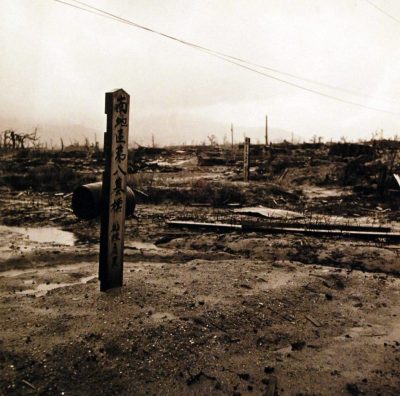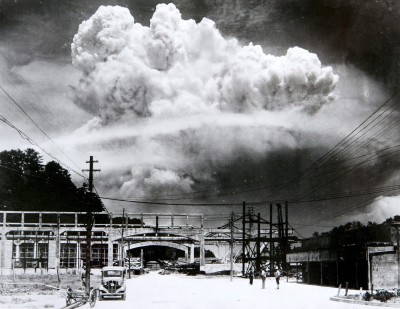Oppenheimer
Christopher Nolan is one of my favorite living directors. The Dark Knight Trilogy, Inception, Interstellar, and Dunkirk are all big, eye-catching Hollywood spectacles, but with a difference. They are highly imaginative, deal with serious themes, have compelling dramatic conflicts, and are often quite moving. Nolan is not particularly politically correct, either. Granted, his last film, Tenet — with its ludicrous Affirmative Action Hero — was a major disappointment. But with Oppenheimer, he returns to form.
Oppenheimer has a highly literate script with important ideas and powerful dramatic situations, striking visuals without digital hokum, and superb performances from a vast cast. Cillian Murphy, who has appeared in five other Nolan films, gives his best performance in the title role. Robert Downey, Jr. is excellent as Admiral Lewis Strauss. Josh Harnett, Kenneth Branagh, Matt Damon, and Emily Blunt also deserve special mention. The only bad performance is Gary Oldman’s cameo as Harry Truman, which is more a problem with the script. Ludwig Göransson’s music is excellent. Let’s hope Nolan never returns to the Hans Zimmer factory.
Oppenheimer is the story of J. Robert Oppenheimer (1904–1967), the American-born Jewish physicist who directed the Manhattan Project that created the American atomic bomb.
Oppenheimer is not portrayed as a stainless hero or a martyr. He’s complicated. His genius is elusive. If you think atomic physics is hard to understand, imagine dramatizing it on the screen in tiny snippets. There is no doubt, though, that Oppenheimer was neurotic, narcissistic, megalomaniacal, and at best morally stunted. Early on in the film, he tries to murder one of his teachers over a minor humiliation. Moral qualms only occur to him the next morning.
After Hiroshima, Oppenheimer is clearly high on the acclaim of his colleagues. He delivers a little speech. He begins clinically. It is too early to evaluate the effects of dropping an atomic bomb on a city full of people — but he’s “sure the Japanese don’t like it.” Hardy-har-har-har. “Too bad,” he adds, that they “couldn’t have dropped it on the Germans.” Nolan uses his cinematic wizardry to intimate that Oppenheimer and his team had severe moral qualms about all this. But I don’t buy it.
I have no doubt that Christopher Nolan’s mind operates within “normal” moral and political parameters, but he’s never been “all in” on political correctness.
There are a few black characters in his films cast against type. In Oppenheimer, they are mostly wildly out of place faces in the crowd. All the main characters here are white or Jewish.
In Dunkirk, Nolan made a Second World War film that only referred to “the enemy.” Not zee Germans. Not zee Nazis. He had plenty of opportunity to deliver the standard platitudes, but instead he made a touchingly patriotic movie about the British returning home.
In Oppenheimer the Nazis loom larger, of course, but Nolan still foregoes cheap shots. When Oppenheimer says that the Nazis are “abusing” his people in their “camps,” this is surely historically realistic, but every other director would have juiced it up considerably. When Oppenheimer says that he hopes that “anti-Semitism” will impede German atom bomb research, the moral is not that Hitler chased away all the genius Jewish physicists. Oppenheimer knew the Germans had formidable thinkers such as Werner Heisenberg. But Hitler thought atomic physics was Jewish, thus he might not have given it the attention it deserved. This, too, is at least historically plausible.
Nobody could make a film about Oppenheimer and the Manhattan Project without mentioning Jews. Oppenheimer, Edward Teller, Isidore Isaac Rabi, Robert Serber, Lilli Hornig, Richard Feynman, and Leo Szilard were all Jewish. Oppenheimer’s brother Frank, Albert Einstein, and Admiral Lewis Strauss are other Jewish characters.

You can buy Trevor Lynch’s Classics of Right-Wing Cinema here.
It is interesting, though, that Nolan depicts Jewish tribal animus against the Germans as a major motive of the Manhattan Project. Indeed, when Germany surrendered, a number of these figures suddenly developed moral qualms about using the bomb on Japan.
The film leaves their motives murky. Clearly, some saw themselves as fighting against Germany, not for America, so once Germany was down, they lost interest in the war. Others, perhaps, had moral qualms about dropping the bomb on non-whites (but not on whites). The Manhattan Project was also riddled with Soviet spies, such as Klaus Fuchs, and once Germany surrendered, their priority would have been to slow down the American nuclear program until the Soviets could catch up.
Oppenheimer himself accepted the Pentagon rationale for bombing Hiroshima and Nagasaki: It would end the war quicker, save lives, bring our boys home, etc. He refused to sign petitions against bombing Japan, arguing that it was not the role of scientists to choose how the weapons they developed were used. Oppenheimer had no personal reasons for wanting to bomb Japan. He had already tested an atomic bomb in New Mexico, proving the effectiveness of both the weapon and his leadership. Unless he was curious to test his weapon on human subjects.
But after the war, Oppenheimer suddenly grew a conscience, opposing the development of the hydrogen bomb and promoting arms control talks and global government schemes.
Oppenheimer’s motives were murky. But it did not go unnoticed that his recommendations aligned with Soviet strategic interests. Nor did it go unnoticed that Oppenheimer was at the very least a Communist fellow traveler: a pinko, if not an outright red. His brother and sister-in-law were Communist Party members. His wife and mistress were also card-carrying Communists, as were some of his colleagues and friends at Berkeley. Trailing behind the party members was a long tail of fellow-travelers and sympathizers.
Nolan dutifully depicts the standard lies and evasions of the reds and pinkos: they were idealists; they were humanitarians; they were New Deal Democrats — they were anything, really, except willing conspirators working for the triumph of the most stupid, evil, and murderous ideology in human history. But Nolan also shows that Oppenheimer was approached by a Soviet agent through a friend on the Berkeley faculty. Only belatedly did he reveal this to the military, and when he did, he lied about his intermediary. Oppenheimer was, moreover, cavalier about security at Los Alamos.
The man was obviously a security risk. The United States government tolerated him because he was useful to the war effort. But after the war, when he became an obstruction to the H-bomb program, his security clearance was revoked and he was sidelined.
The story of Oppenheimer’s post-war travails is the weakest part of the movie, cutting back and forth between Oppenheimer’s security clearance hearing and a Senate hearing about Admiral Strauss’ (ultimately failed) appointment to the Eisenhower cabinet.
A more conventional filmmaker would have depicted Oppenheimer as the innocent victim of an anti-Communist “witch hunt.” (Oppenheimer could not be depicted as a victim of anti-Semitism because his principal opponents, Strauss and Teller, were both Jews as well.) Nolan, however, teases out the full moral complexity of the situation, and although he handles it all with great dynamism, he bloats the running-time of the movie to three hours.
In this case, I think that Nolan got too close to the material, causing his dramatic instincts to fail him. Inception, Interstellar, The Dark Knight Rises, and Dunkirk all have emotionally shattering conclusions. But Oppenheimer is emotionally flat as well as flabby. If Nolan had focused on ending the film with the bombing of Japan, the emotional impact could have been measured in kilotons, but 40 minutes of hearing drama turns it into a damp squib.
Despite these problems, Oppenheimer is a serious and worthwhile film. It is not Nolan at his best, but even pretty good Nolan is better than most directors today.
* * *
Counter-Currents has extended special privileges to those who donate $120 or more per year.
- First, donor comments will appear immediately instead of waiting in a moderation queue. (People who abuse this privilege will lose it.)
- Second, donors will have immediate access to all Counter-Currents posts. Non-donors will find that one post a day, five posts a week will be behind a “Paywall” and will be available to the general public after 30 days.
- Third, Paywall members have the ability to edit their comments.
- Fourth, Paywall members can “commission” a yearly article from Counter-Currents. Just send a question that you’d like to have discussed to [email protected]. (Obviously, the topics must be suitable to Counter-Currents and its broader project, as well as the interests and expertise of our writers.)
To get full access to all content behind the paywall, sign up here:
Paywall Gift Subscriptions
 If you are already behind the paywall and want to share the benefits, Counter-Currents also offers paywall gift subscriptions. We need just five things from you:
If you are already behind the paywall and want to share the benefits, Counter-Currents also offers paywall gift subscriptions. We need just five things from you:
- your payment
- the recipient’s name
- the recipient’s email address
- your name
- your email address
To register, just fill out this form and we will walk you through the payment and registration process. There are a number of different payment options.




